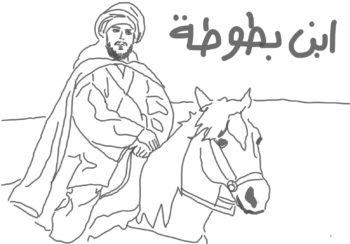Arabic Comprehension and Grammar Exercise (2) Ibn Battuta Posted by yasmine on Aug 18, 2021 in Arabic Language, comprehension, Grammar, Ibn Battuta, Vocabulary
In this post, we have a fun Arabic comprehension and grammar exercise where we will extract grammatical structures and words from the text below about the famous Arab traveler known as Ibn Battuta ابن بطوطة. I thought this would be a good way to review your Arabic grammar and comprehension skills while learning about a famous Arab figure. (see answers at end of post)
Briefly, ابن بطوطة was a Moroccan medieval Muslim traveler مُسافر, scholar عالِم, and explorer مُسْتَكْشِف who traveled more than any other explorer in pre-modern history. He also wrote one of the most famous travel logs called الرِّحلة describing the places الأماكن, people الناس, and cultures الثقافات he encountered on his journeys.
Here are two videos; one in Arabic and one in English about ابن بطوطة for those of you who would like to know more.
ابن بطوطة | الرجل الذى رأى العالم فى أطول رحلة فى التاريخ✨
✨Ibn Battuta | PBS World Explorers
ابن بطوطة
وُلِدَ شمس الدين مُحَمّد بن عبد الله الطنجيّ، المَعروف بابن بَطوطة، في مدينة طنجة في المَغرِب في القَرْن الرابِع عَشَر الميلادي. وفي شبابه، قَرَرَ أن يُسافر إلى الحِجاز ليَزور المدينة ويؤدي فريضة الحَج في مكة
كان ابن بطوطة في ذلك الوَقت شاباً عمره حوالي عشرين عاماً، وكانت هذه أول رِحلة قامَ بِها خارِج المَغرِب ولكنها لَم تَكُن الأخيرة. استَمرَّت رحلاته حوالي ثلاثين عاماً زارَ فيها أكثر مِن أربعين بلداً وعادَ بَعدها إلى المَغرب ليُصبح رَجُلاً مَشهوراً
في البِداية، اتَّجَهَ ابن بطوطة شَرقاً نَحو الجزائِر ثُمَ تونس وليبيا حتى وَصَلَ إلى مَصر، ومنها اتجه إلى فلسطين وسوريا، ثم اتجه جنوباً إلى المَمْلكة العربية السعودية ليزور مكة والمدينة. امتدَت رِحلات ابن بطوطة بعد الحج، فزارَ الهند والصين وبعض دول آسيا الوسطى وأفريقيا
في ذلك الوقت، كانت هذه الرِّحلات مُغامرات حقيقية وفيها الكثير مِن الخَطر والصعوبة. لا سيارات، ولا طائِرات ولا قِطارات. لا حدود دولية وجوازات سَفَر. لا هواتِف محمولة ولا انترنت. ولا حجوزات في الفنادِق أو المَطاعِم. ولكن كان هُناك نجوم تَسطَع في السماء ليلاً ويُمكِنُكَ أن تَستخدمِها في المِلاحة، وشمس تُشرِق وتَغرُب في نفس الاتجاه كل يوم ويُمكِنُك أن تَستَخدِمها في تحديد خَط سَيرك. واستَخدَم المُسافرون الجِمال والحَمير والخَيل أو اتَّجهوا سَيراً على الأقدام. وكان هناك مُدُن وقُرى فيها سُكان يَمتازون بالكَرَم وحُسن الضِّيافة
?After reading the text, try to extract the following:
فعل مُضارع present tense 2
فعل ماضي past tense 3
جمع plural form 5
اسم مؤنث feminine noun 2
اسم مُذكر masculine noun 3
لام قمرية lunar lam 2
لام شمسية solar lam 2
إضافة possessive 1
حرف جر preposition 3
اسم إشارة demonstrative noun 1
وصف adjective 2
اسم مكان name of place 2
نفي negation 1
عدد number 3
عدد ترتيبي ordinal number 1
تاريخ date 1
حيوان animal 3
بلد عربي Arab country 3
بلد غير عربي Arab country 2
مدينة عربية Arab city 2
“كلمة أخرى تعني “تقريباً another word that means
“كلمة أخرى تعني “موبايلات another word that means
وسائل نقل حديثة modern transportation 3
“عكس كلمة “تُشرِق the opposite of the word
“عكس كلمة “داخل the opposite of the word
قارة continent 2
Translation: Ibn battouta
Shams al-Din Muhammad ibn Abdullah al-Tanji, better known as Ibn Battuta, was born in the city of Tangiers in Morocco in the fourteenth century AD. In his youth, he decided to travel to the Hijaz to visit Medina and perform the Hajj pilgrimage in Mecca. Ibn Battuta was at that time a young man of about twenty years old, and this was his first trip outside Morocco, but it was not the last. His travels lasted about thirty years, during which he visited more than forty countries and then returned to Morocco to become a famous man. At first, Ibn Battuta headed east towards Algeria, then Tunisia and Libya, until he reached Egypt, from which he headed to Palestine and Syria, then headed south to the Kingdom of Saudi Arabia to visit Mecca and Medina. Ibn Battuta’s travels extended after the Hajj, and he visited India, China, and some countries in Central Asia and Africa. At the time, these trips were real adventures with a lot of danger and difficulty. No cars, no planes, no trains. No international borders and passports. No cell phones or internet. No hotel or restaurant reservations. But there were stars shining in the sky at night that you could use for navigation, and a sun that rose and set in the same direction every day that you could use to mark your route. The travelers used camels, donkeys, and horses, or went on foot. There were cities and villages where people were distinguished by generosity and hospitality.
?Here are the answers. Note that there may be different answers that are also correct.
فعل مضارع: يُسافر، يؤدي
فعل ماضي: وُلِدَ، قَرَرَ، اتَّجَهَ، وَصَلَ
جمع: رِحلات، دول، مُغامرات، سيارات، جوازات
اسم مؤنث: مدينة، فريضة
اسم مذكر:قَرْن، حَج، سماء
لام قمرية : القَرْن، المِلاحة
لام شمسية: الرِّحلات، الضِّيافة
إضافة: رِحلات ابن بطوطة
حرف جر: في، إلى، من
اسم إشارة : هذه
وصف: حقيقية، مَشهوراً
اسم مكان: الفنادِق، المَطاعِم
نفي: لم تكن
عدد: عشرين، أربعين، ثلاثين
عدد ترتيبي: أول
تاريخ: القَرْن الرابِع عَشَر الميلادي
حيوان: الجِمال، الحَمير، الخَيل
بلد عربي: المَغرِب، المَمْلكة العربية السعودية، مصر
بلد غير عربي: الهند، الصين
مدينة عربية: مكة، طنجة
كلمة أخرى تعني تقريباً: حوالي
كلمة أخرى تعني موبايلات: هواتِف محمولة
وسائل نقل حديثة: سيارات، طائِرات، قِطارات
عكس كلمة “تُشرِق”: تَغرُب
عكس كلمة “داخل”: خارِج
قارة: آسيا، أفريقيا
I hope you found this exercise to be a good Arabic practice/review. Till next week, happy Arabic learning! ?

Build vocabulary, practice pronunciation, and more with Transparent Language Online. Available anytime, anywhere, on any device.





Comments:
Sumaira:
Very interesting, informative and helpful to revise the grammar concepts.????
Syed Abid Ali:
Thank you Yasmine.
Keep up the good work!
Kim:
Text such as Ibn Batutta is just what I need to take my understanding of written Arabic to the next level. Thank you.